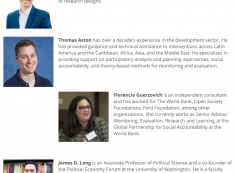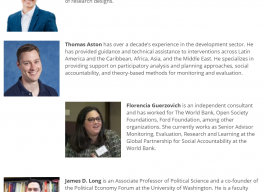Description
Theories of change are a set of hypotheses of how and why change happens and what social accountability’s contribution may be. Theories of change and similar forms of causal models have become increasingly popular in the last few years to inform funding decisions and monitor, research, evaluate and learn from those decisions in the social…
Informations sur le Conférencier/Moderateur/Instructeur
Nom
Tom Aston
Organisation
SALT Project
Titre
Monitoring & Evaluation Consultant
Biographie
Tom Aston is a consultant specialising in theory-based evaluation methods. He has worked as a consultant for various international organisations, including CARE, World Vision, the World Bank and the Overseas Development Institute. He has a PhD in Development Planning from University College London.
Nom
James D. Long
Organisation
University of Washington
Titre
Associate Professor
Biographie
James D. Long is an Associate Professor of Political Science and a co-founder of the Political Economy Forum at the University of Washington.
Nom
Florencia Guerzovich
Organisation
Grupo Politeia - #ACT4Delivery - Global Partnership for Social Accountability
Titre
Consultant
Biographie
Florencia is an international consultant, Sr. MERL Advisor, Global Partnership for Social Accountability, collaborating researcher with Grupo de Pesquisa Politeia (UDESC) & co-founder of #ACT4Delivery. She holds a PhD in political science from Northwestern University and is based in Brazil.
Nom
Estelle Raimondo
Organisation
Independent Evaluation Group - World Bank Group
Titre
Senior Evaluation Officer
Biographie
Estelle Raimondo is an evaluation expert in IEG’s Human Development Unit. She is a specialist in evaluation methods and advises teams across IEG on a wide range of research designs.
les mémoires de votre événement

Principaux sujets discutésTheories of change and similar forms of causal models have become increasingly popular in the last few years to inform funding decisions and monitor, research, evaluate and learn from those decisions in the social accountability field. Yet, this has not been without its implementation challenges.
One of the “original sins” is that many theories of change, including those in the social accountability sector, tend to have very little explicit theory, and hypotheses are often untestable or untested. In this webinar, we will discuss how innovators are using mid-level theory to address this “original sin” at project, portfolio and field levels.
One of the “original sins” is that many theories of change, including those in the social accountability sector, tend to have very little explicit theory, and hypotheses are often untestable or untested. In this webinar, we will discuss how innovators are using mid-level theory to address this “original sin” at project, portfolio and field levels.
ConclusionsMid-level theory building can be useful to support decision-making at project, portfolio and field levels.
In the social accountability space, theoretical gaps about complex sustainability, system strengthening and scalability processes are particularly salient. Evaluations miss results due to their theoretical framework.
Efforts making progress filling this gap are: putting practice and practitioners' tacit knowledge first, using iterative inductive-deductive approaches, embracing political thinking and using a broader methodological toolbox.
Stakeholders at different levels need complementary, but different information. Awareness about different levels of abstraction is important to produce fit for purpose MERL for concrete audiences.
In the social accountability space, theoretical gaps about complex sustainability, system strengthening and scalability processes are particularly salient. Evaluations miss results due to their theoretical framework.
Efforts making progress filling this gap are: putting practice and practitioners' tacit knowledge first, using iterative inductive-deductive approaches, embracing political thinking and using a broader methodological toolbox.
Stakeholders at different levels need complementary, but different information. Awareness about different levels of abstraction is important to produce fit for purpose MERL for concrete audiences.
Actions de suiviThe webinar is part of ongoing research and learning activities to support stronger monitoring, evaluation, research and learning in the social accountability space, especially through mid-level theory.
Total Participants:
120
- Professeur Institution
- ONG
- Secteur Privé
- Gouvernement
- Profesional de Evaluación
- Étudiant
- Otre
Affiliation des participants (estimée ou reale)
Photos

Videos
Ressources: Sites Web
Ressources: Fichiers
Cedil 2 pager_design 2 (1).pdf376.25 Ko
Powerpoint Presentation: Files
gLOCAL (2).pptx25.4 Mo




Co-organisé parGrupo Politeia - University of the State of Santa Catarina, Brazil, Global Partnership for Social Accountability (The World Bank) , SALT Project , World Vision UK , Wahana Visi Indonesia, World Vision-Cambodia, World Vision- DRC, University of Cape Town
À propos Grupo Politeia / #Act4Delivery
Florencia Guerzovich is an independent consultant and researcher. Florencia is a collaborating researcher with Grupo de Pesquisa Politeia - Coprodução do Bem Público: Accountability e Gestão, ESAG – Universidade do Estado de Santa Catarina (Brasil) and a co-founder of #Act4Delivery. She is also Sr. Advisor, Monitoring, Evaluation, Research and Learning for the Global Partnership for Social Accountability (The World Bank) and member of the team of the Center of Excellence for Development Impact and Learning funded Scaling Social accountability for Health: leveraging public policies and programmes project (SALT).
Florencia has been innovating, connecting, researching, and problem solving for big, complex governance problems since 2000, when she joined the Department of Transparency Policies of the Argentinean Anti-corruption Office. Her past clients include the Open Society Foundations, Ford Foundation, Inter-American Development Bank, PSAM, Global Integrity, among others. Florencia has also served the Transparency and Accountability Initiative’s Program Officer, Impact and Learning.
Florencia earned her PhD in political science from Northwestern University. She also has a Master’s degree in International Relations from FLACSO/Argentina and a Bachelor’s of Arts in International Studies from Universidad Torcuato di Tella in Argentina.
Florencia has been innovating, connecting, researching, and problem solving for big, complex governance problems since 2000, when she joined the Department of Transparency Policies of the Argentinean Anti-corruption Office. Her past clients include the Open Society Foundations, Ford Foundation, Inter-American Development Bank, PSAM, Global Integrity, among others. Florencia has also served the Transparency and Accountability Initiative’s Program Officer, Impact and Learning.
Florencia earned her PhD in political science from Northwestern University. She also has a Master’s degree in International Relations from FLACSO/Argentina and a Bachelor’s of Arts in International Studies from Universidad Torcuato di Tella in Argentina.





